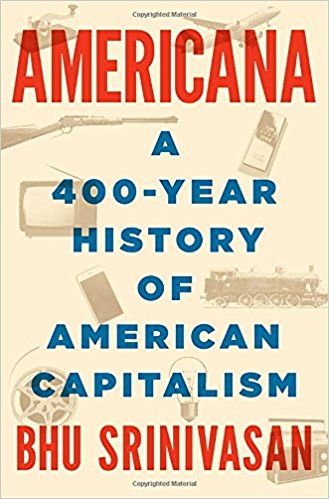You have /5 articles left.
Sign up for a free account or log in.
 Americana: A 400-Year History of American Capitalism by Bhu Srinivasan
Americana: A 400-Year History of American Capitalism by Bhu Srinivasan
Published in September of 2017.
Americana is U.S. economic history told through a present-day entrepreneurial lens. This is a book that just may cause a business major to switch to history. Or a history major to go into venture capitalism.
There is a subset of book readers who are equally interested in both future innovation and economic history. A book that combines both of these perspectives is indeed rare. So rare, in fact, that I’m left with a few questions for the author, for any card-carrying professional historian who happens to read this review, and for you:
Question 1 (for the author, but you can also answer). How in the world does a non-historian learn enough about 400 years of American economic history to write this sort of book?
Not being an historian (although I my undergraduate major was American history), I’m not in a position to know if Americana breaks any new ground. I suspect that the book is more a synthesis of existing works, rather than an example of original scholarship using primary sources.
Still, Srinivasan’s voice is always original and the stories he tells are always informative.
The book is organized thematically, with short chapters on subjects as diverse as taxes, tobacco, and suburbia. (35 chapters and themes in all). This organizational structure greatly aids the story, as Srinivasan is able to jump from historical origins to modern significance.
I’m blown away by the chutzpah of the author in synthesizing so much historical information into a coherent narrative.
Question 2 (for the professional historian). Would you ever read this book?
Will any historian ever read a popular book by a non-historian about history? And if they did, would they admit it to their colleagues?
A related question is if this book, or a book like it, would ever be assigned in a college level history class? Anyone reading this book will not learn how to do history. Rather, they may develop an interest in history - as the historical figures and themes are related to current issues.
It would be interesting to hear from historians about where Americana gets it wrong. Is the story of the pilgrims and the Mayflower as much as one of economic speculation as that of a desire for religious freedom? Is it true that the economics of the slave-based Southern cotton economy made the Civil War, and the eventual defeat of the South, all but inevitable?
Question 3 (for you). What other economic history books would you recommend?
If I were forced to choose a single topic in which every book that I read would be about, I’d choose economic history. Some economic history books that I’ve loved include:
- The Great Transformation: The Political and Economic Origins of Our Time
- The Rise and Fall of American Growth: The U.S. Standard of Living since the Civil War
- An Empire of Wealth: Rise of Amer Economy 1607-2000
- The Ascent of Money: A Financial History of the World
- Land of Promise: An Economic History of the United States
- False Economy: A Surprising Economic History of the World
- A Little History of Economics
Can you suggest others?
What are you reading?




